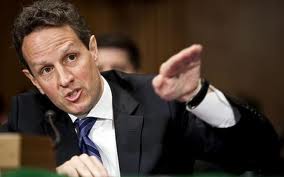 In what is likely to become his last major interview before stepping down from this post as Secretary of the United States Treasury, Timothy F. Geithner told the Wall Street Journal (WSJ) that a full recovery of the housing market was impossible during his tenure. Geithner's term as Treasury Secretary has captured recent headlines as he is packing up his desk and getting ready to return to the private sector. During his interview with the WSJ, Geithner mentioned that even with greater funding and more leeway to intervene, there was not much else that could have been done to help the ailing housing market. He mentioned, however, that housing has now gone through the major adjustment period. He also used a basketball analogy to indicate that the U.S. economy has just started the fourth quarter in terms of recovery. Housing Programs and Housing Problems Under Geithner's term, various White House initiatives to improve the opportunities of homeowners to stay in their homes and avoid did not perform as expected. In fact, the housing crisis was a low point of the recovery until 2012. Geithner's critics point out that reductions of principal mortgage balances should have been offered from the start, but it is important to remember that the acting Director of the Federal Housing Financial Authority (FHFA), Edward DeMarco, stood in the way of making write downs a reality for Fannie Mae and Freddie Mac mortgages. A precipitous replacement of DeMarco would have set off a political firestorm, and Geithner was not known to be overly political during his term. In his WSJ interview, Geithner explained that the amount needed for a comprehensive write down was not there anyway; it would have required more than $500 billion. Still, all the funds actually available to help about four million homeowners have not yet been utilized. Not Enough Authority Even with the Troubled Asset Relief Program (TARP) in place, Geithner explained that the U.S. government did not have full authority to command banks to execute massive write downs. Geithner was very supportive of just about every White House initiative to shore up the housing economy, but there was only so much that could be done. As Geithner steps down, an inquiry into his role as President of the New York Federal Reserve Bank of New York back in 2007 is being scrutinized. Long before TARP had to be hastily implemented, the Federal Reserve could have immediately intervened and drastically reduced interest rates before the collapse of subprime mortgage-backed securities brought down Wall Street. Recently released transcripts from 2007 seem to show that Geithner was supportive of rate intervention, but the Fed did not pull the trigger until later.
In what is likely to become his last major interview before stepping down from this post as Secretary of the United States Treasury, Timothy F. Geithner told the Wall Street Journal (WSJ) that a full recovery of the housing market was impossible during his tenure. Geithner's term as Treasury Secretary has captured recent headlines as he is packing up his desk and getting ready to return to the private sector. During his interview with the WSJ, Geithner mentioned that even with greater funding and more leeway to intervene, there was not much else that could have been done to help the ailing housing market. He mentioned, however, that housing has now gone through the major adjustment period. He also used a basketball analogy to indicate that the U.S. economy has just started the fourth quarter in terms of recovery. Housing Programs and Housing Problems Under Geithner's term, various White House initiatives to improve the opportunities of homeowners to stay in their homes and avoid did not perform as expected. In fact, the housing crisis was a low point of the recovery until 2012. Geithner's critics point out that reductions of principal mortgage balances should have been offered from the start, but it is important to remember that the acting Director of the Federal Housing Financial Authority (FHFA), Edward DeMarco, stood in the way of making write downs a reality for Fannie Mae and Freddie Mac mortgages. A precipitous replacement of DeMarco would have set off a political firestorm, and Geithner was not known to be overly political during his term. In his WSJ interview, Geithner explained that the amount needed for a comprehensive write down was not there anyway; it would have required more than $500 billion. Still, all the funds actually available to help about four million homeowners have not yet been utilized. Not Enough Authority Even with the Troubled Asset Relief Program (TARP) in place, Geithner explained that the U.S. government did not have full authority to command banks to execute massive write downs. Geithner was very supportive of just about every White House initiative to shore up the housing economy, but there was only so much that could be done. As Geithner steps down, an inquiry into his role as President of the New York Federal Reserve Bank of New York back in 2007 is being scrutinized. Long before TARP had to be hastily implemented, the Federal Reserve could have immediately intervened and drastically reduced interest rates before the collapse of subprime mortgage-backed securities brought down Wall Street. Recently released transcripts from 2007 seem to show that Geithner was supportive of rate intervention, but the Fed did not pull the trigger until later.



